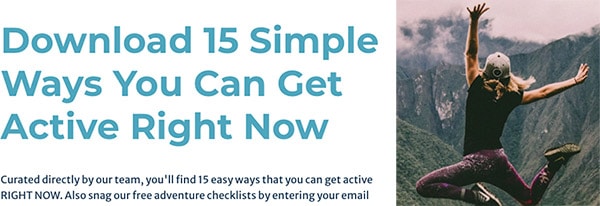So, your getting all of your camping supplies together for the weekend and it’s time to pack the water. How much do you need?
And, if you’re bringing the doggo along, how much extra should your bring for your animals?
While it’s always better to have too much water than not enough on your camping trip, let us help you determine a good amount for your next camping trip.
How Much Drinking Water Each Person Needs Per Day

Let’s start with the basics – how much water each person needs to survive on each day. That’s the perfect starting point, and the bare minimum amount of water to take with you.
The rule of thumb is at least 2 liters (0.5 gallons) of water per day for each person – and more in hotter climates.
The National Park Service notes that two liters is the daily amount of water needed to survive, but this is assumes a moderate climate. It it’s warm, or if you’re doing anything active, like hiking, then you’ll need more water.
Keep in mind that this is just for drinking water.
You’ll also probably need some water for cooking and cleaning. And for personal hygiene – brushing your teeth, washing your face, etc.
How Much Water For Dogs When Camping?
If you’ve got your four-legged friend along for the camping trip, then you need to plan for your pet’s water consumption needs as well.
According to Backpacker, the amount of water your dog needs can be calculated based on the dog’s size and weight.
- For large dogs, plan for 0.5 to 1 ounce of water per pound, per day.
- For small dogs (under 20 pounds), plan for 1.5 ounces per pound, per day.
Keep in mind that these are just general guidelines, so if it’s a hot day or if your pup is getting a lot of exercise at the campsite, then you’ll likely need more water for the dog.
Tip: If your dogs nose is dry, then you’re not giving him enough water.
To keep things simple, just give your dog water each time you stop for water yourself. This way you’ll know exactly how often your doggo gets something to drink.
What To Consider
When planning your water needs, take a moment to think about what you expect your camping trip to be like.
- Will you be doing any activities like hiking or kayaking?
- Is the temperature going to be hot?
- Are you going to have a lot of sun exposure?
- Are you taking any pets on the camping trip?
- Are you taking any children with you?
- Is there a water source near the camp site?
- Are you planning on using a portable camp shower?
If you’re going to be engaging in activities or spending time out in the sun, then you’re going to need to plan for extra water needs. Ditto for warmer temperatures.
Children need less water per day than adults. And if you’re taking pets, then they’ll also need some water.
If you’re staying at, or near, a campground, then you may have easy access to safe drinking water. With that being the case, you can pack less knowing that you can easily get more.
You may also have a lake or river near the campsite. If this is true, then you can use water purification tablets or a survival filter to clean the water as needed. Boiling the water is another good option to purify it.
Tip: If you’re hiking in to your campsite pre-hydrate before the hike in since the activity will use some of fluids.
Though most campers I know don’t camp with a portable shower, there are some that do. So, if you’re heading out to the campsite with your own portable shower – know in advance how much water you’re going to need for that thing.

Signs Of Dehydration To Watch Out For
On your camping trip, get into the habit of drinking small sips of water throughout the day instead of waiting until you start to get thirsty and dehydrated. Jellystone of Estes Park notes that dehydration is commonly experienced by campers.
Let’s look at the signs of dehydration so that you’ll know what to watch for, both for yourself and your family.
- Being thirsty – this is the first sign of getting dehydrated.
- Not needing to pee as much as usual.
- Dry mouth
If you notice those two symptoms, then it’s a good idea to get some water in your system.
Some of the more serious signs of dehydration are:
- feeling lightheaded
- headache
- dry skin
- lethargy
- irritability or confusion
- general body weakness
- elevated heart rate
- low blood pressure
And in extreme cases, you can experience:
- becoming delirious
- losing consciousness
As you can see, dehydration is no joke. That’s why it’s better to take too much water on your camping trip instead of not enough water.
If you’re going car camping, then it will be easy to load up the vehicle with a few gallon jugs of water for your trip.
top image credit: NPS.gov
